|
Stockwood Park Luton
Quotes 2
Get On With It
It's The Business
Stockwood Park
Luton (13 June 2013)
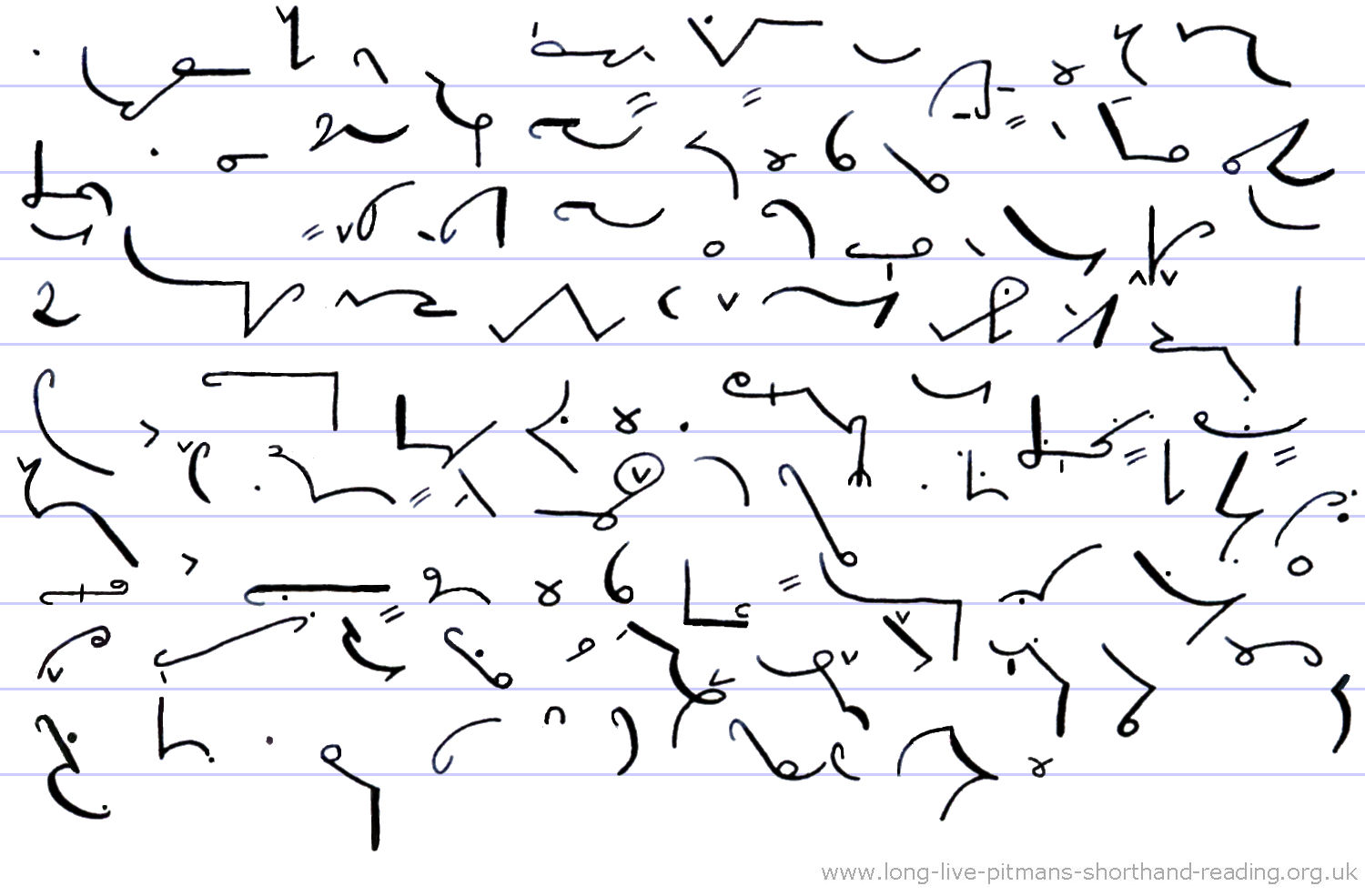
A few weeks ago* I had the opportunity to visit Stockwood Park in Luton.
I think I may have discovered a secret shorthand writing* gardener here.
This piece of box hedging in the Victorian-style walled garden is very
close to being the outline for "shorthand" and I am glad to report that
I managed to resist the urge to clip it further to the correct
dictionary shape. The sculpture in the Discovery Centre I think may be
either a warm-up exercise or perhaps an attempt at the gently* leaning
curves of the Gregg system. This twig-effect metal bench has lines
wandering all over the place, and is obviously inspired by the notepad
pages of someone who was bravely attempting a speed well beyond their
present comfort level.
* Omission phrases "few wee(k)s
ago" "short(hand) writing"
* Insert the last vowel as "gentle" would also make sense

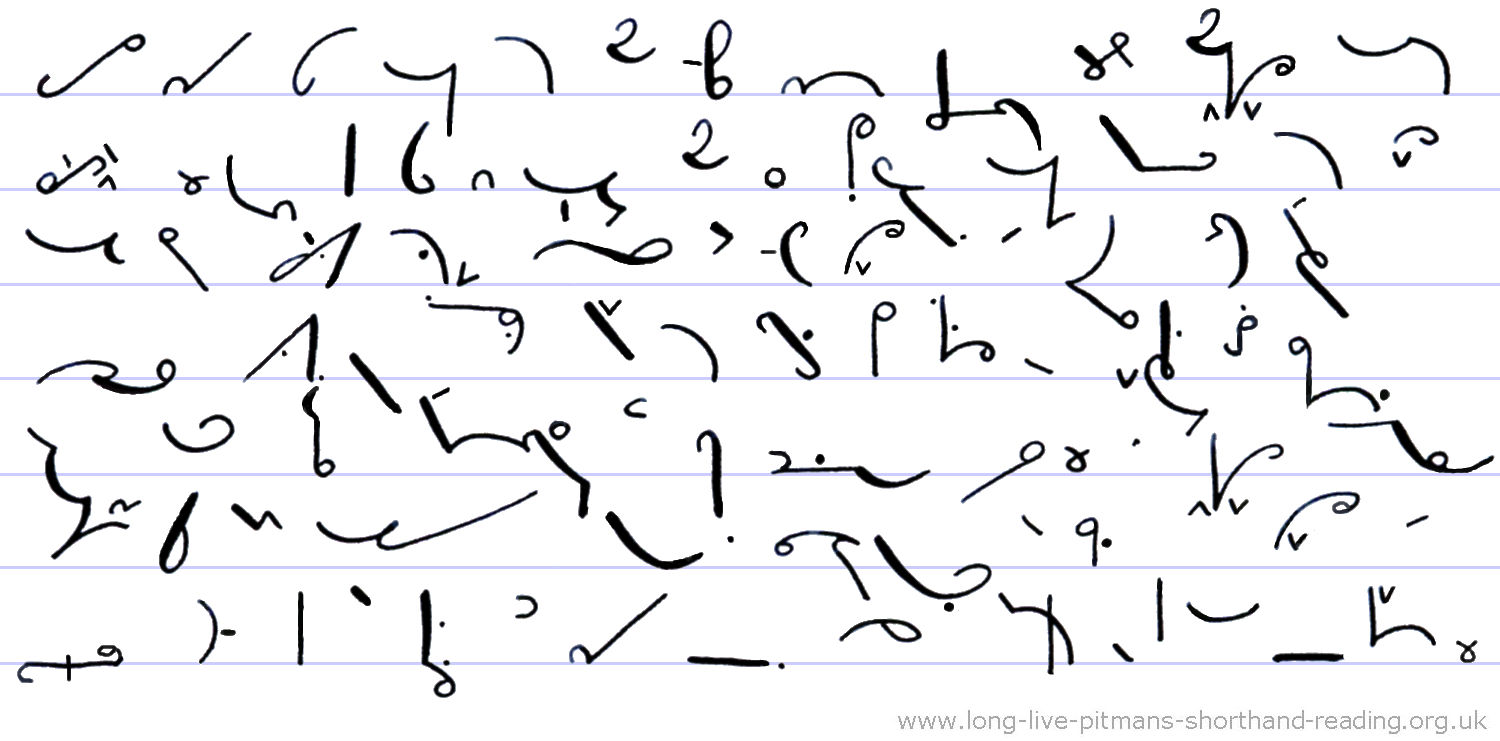
Once you are well into your shorthand studies, you may discover all
sorts of shorthand outlines in your surroundings. If you do, then you
know that the shorthand is settling comfortably into the back of your
mind, in that special storage area, amongst all the other lines and
shapes and their possible meanings, ready to be accessed by your brain
as it attempts to decipher the constant stream of visual information
that it is bombarded with during waking hours. An outline can be seen
just about anywhere, being a simple combination of straight lines and
curves, so it all depends what you are giving most of your attention to
at any given time.

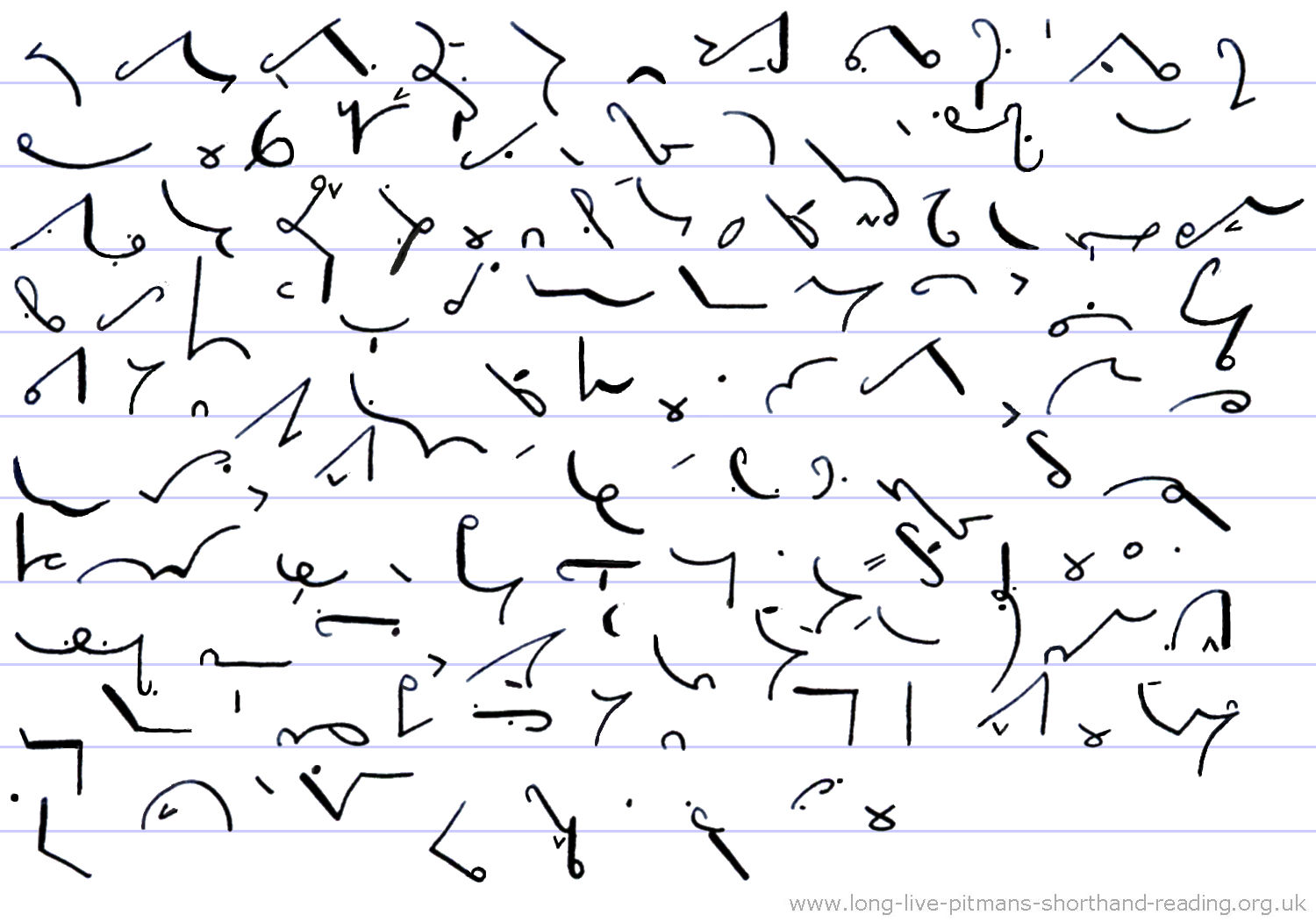
Here we have the wobbly suspended path, made of wooden slabs threaded on
ropes through the centre. This is the ideal way to perfect your powers
of concentration in readiness for that high-speed passage. You step off
the first post and then have to cross the swaying steps one at a time*,
with no chance of going back, and only more of the same challenges
ahead, until you reach the firm post at the end. A little wobble to the
left means having to lean to the right, and vice versa*, and every threat
to perfect balance must be* dealt with immediately, if it is not to
suddenly grow into a full-blown disaster. As an incentive, you can agree
to the rule that, if you fall off, you are not allowed to get back on,
you must start again until you get it right. Fortunately a deep layer of
bark chips provides a comfortable landing.
* Omission phrases "at (a) time"
"mus(t) be"
* "vice versa" Optional contraction
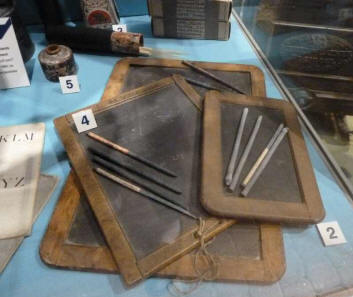
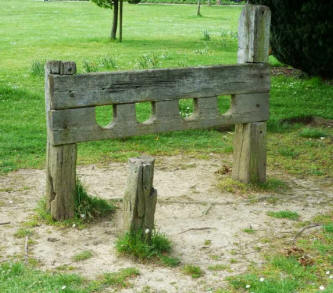
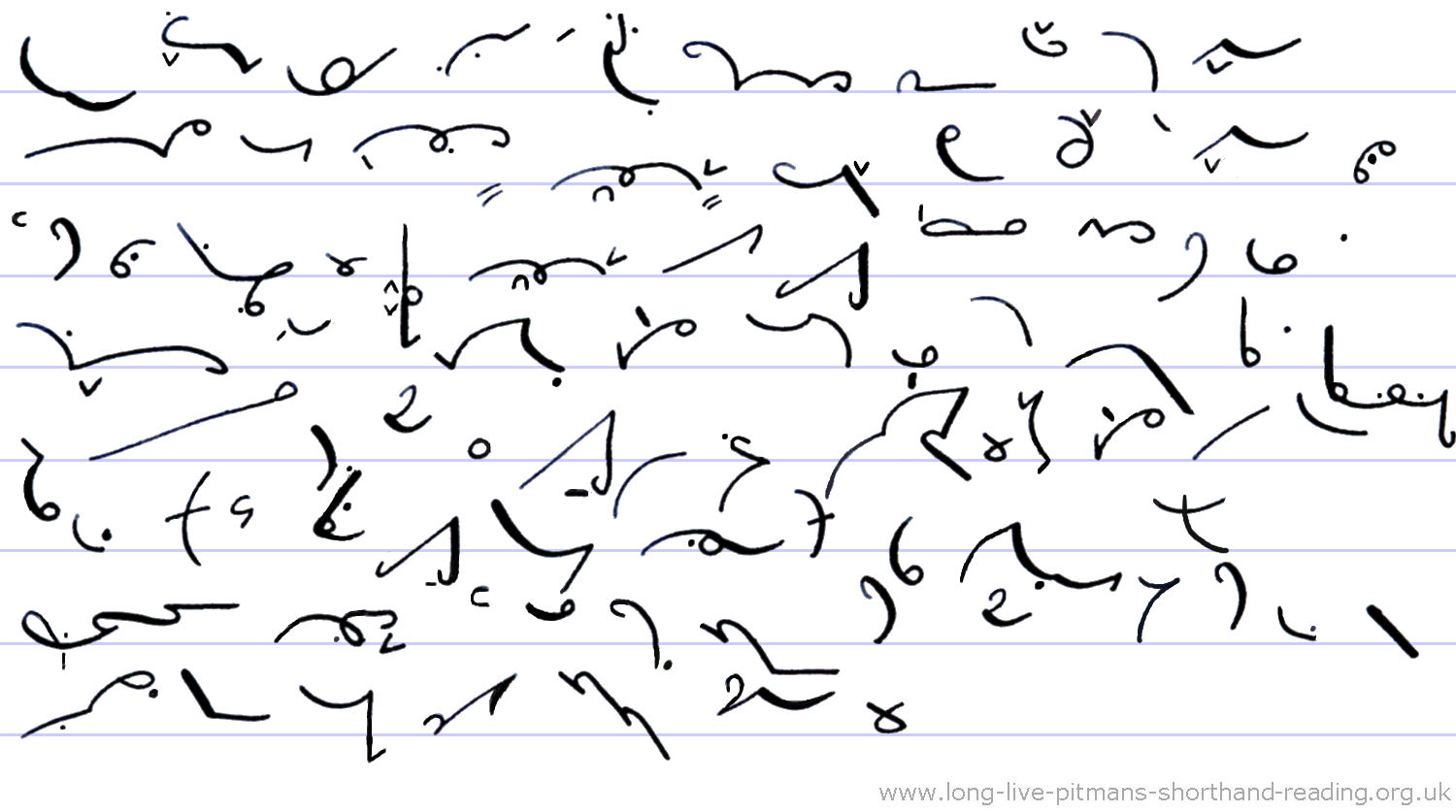
Having acquired the necessary alert and attentive frame of mind*, you can
find your writing materials in the Mossman Museum nearby, several sizes
of writing slates with their slate pencils. Outside the museum are the
wooden stocks and I am not sure if it is a reminder not to leave holes
in your notes, or maybe it is a disincentive to those writers whose
shorthand is routinely completely illegible. I think the holes are for
feet (with the adjacent wooden bench missing) thus leaving the
unfortunate* stenographic miscreant with hands free to practise their
shorthand until they are fit to be released back into the world of
proper* shorthand writing*.
* Omission phrases "frame (of)
mind" "short(hand) writing"
* "unfortunate" Optional
contraction
* "proper" Insert the first
vowel, and the diphone in "appropriate" as these are similar in outline and meaning

Description of the heraldry of the Luton coat of arms
www.ngw.nl/heraldrywiki/index.php?title=Luton
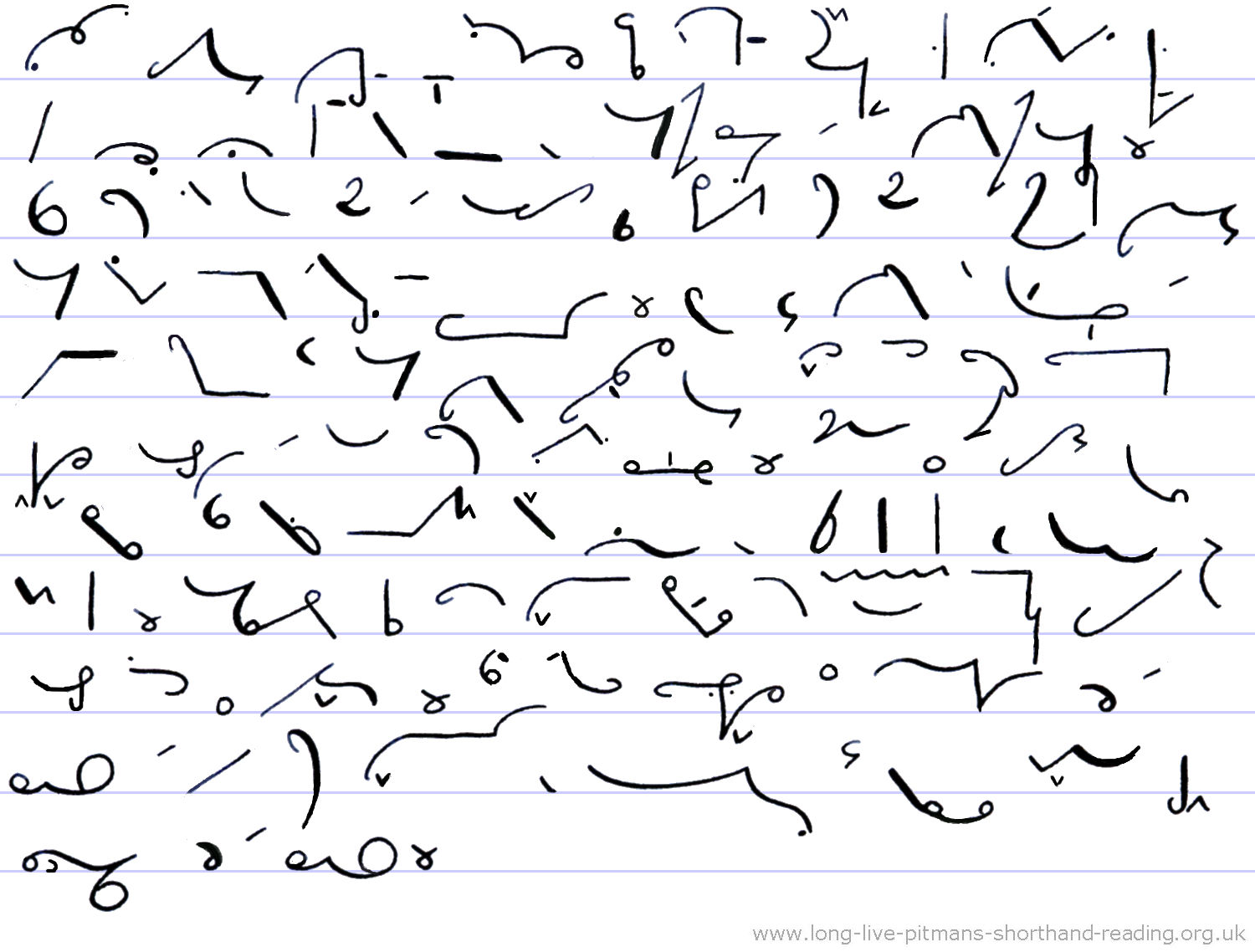
Lastly we have the Luton coat of arms with its motto "Scientiae et
labori detur" which means "May it be given to knowledge/skill and
labour/industry". This is very apt for shorthand, and anyone who has started
their shorthand journey will know that the knowledge part can be obtained quite
quickly. However, without the labour of focused* and
regular practice, that knowledge will be useless if the mind cannot
furnish the correct outlines instantly and in very rapid succession.
Shorthand writing* is one of the few subjects that is best carried out* by
aiming to "just do it" without having to think about it. In this respect
it is more like sports or any activity where instant action is required.
Thoughts often crystallise as mental words and sentences, and are
therefore likely to interfere with the business of writing down someone
elseís words and sentences.
* "focused" Insert the first vowel
in this, and in "fixed" as they are similar in outline and meaning
* Omission phrase "short(hand)
writing"
* "carried out" Halving to
represent the T of "out"
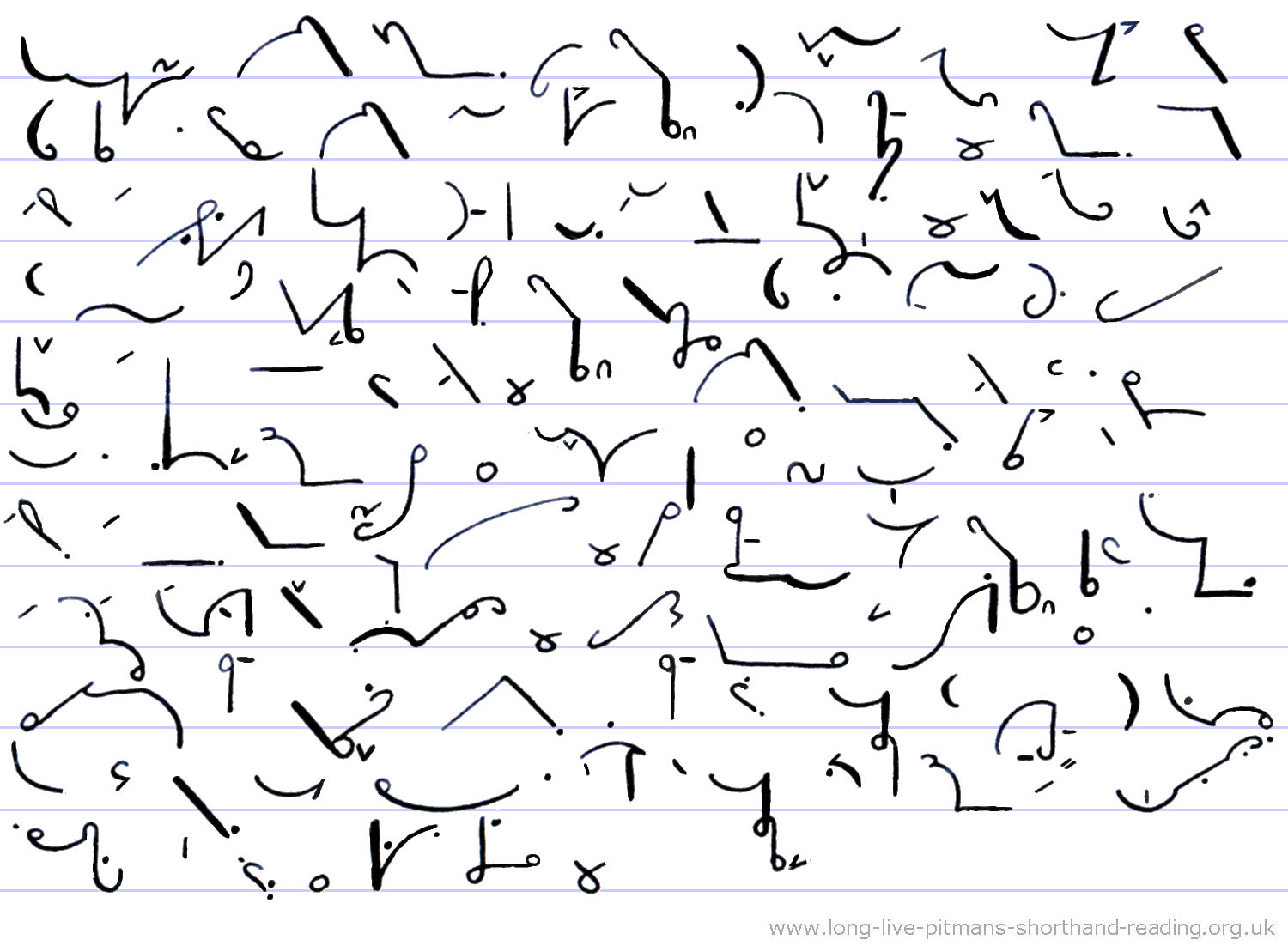
Eventually the labour of practising will produce ease of writing and if
you enjoy the subject, then it is a pleasant labour, and not toil or
drudgery. Practising can be stopped and restarted at any time, so it
need not become tiresome. I have often found that many short periods of
study produce better results* than a long session, where tiredness and
tedium can build up. Labouring to keep up with a speaker in a work
situation is entirely different, as you have no choice of stopping and
coming back to it later on. Such struggling only produces discomfort,
fatigue and errors followed by embarrassment. One of the pictures on the
shield is a circular straw beehive, representing the straw plaiting
industry that Luton was famous for, with the bee in the centre, a model
of industrious hard work and unrelenting concentration on completing his
daily tasks. (796 words)
* Omission phrase "better (re)sults"
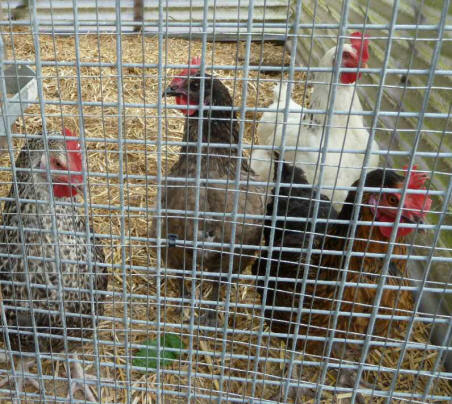
If you want to practise the outline for Cluck, the chickens in the Dig
For Victory Garden are more than willing to provide free live dictation
Top of page
Quotes 2 (14 June 2013)
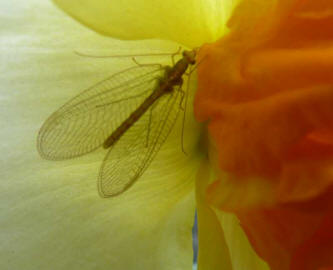
Lacewing in the shade - not getting eaten
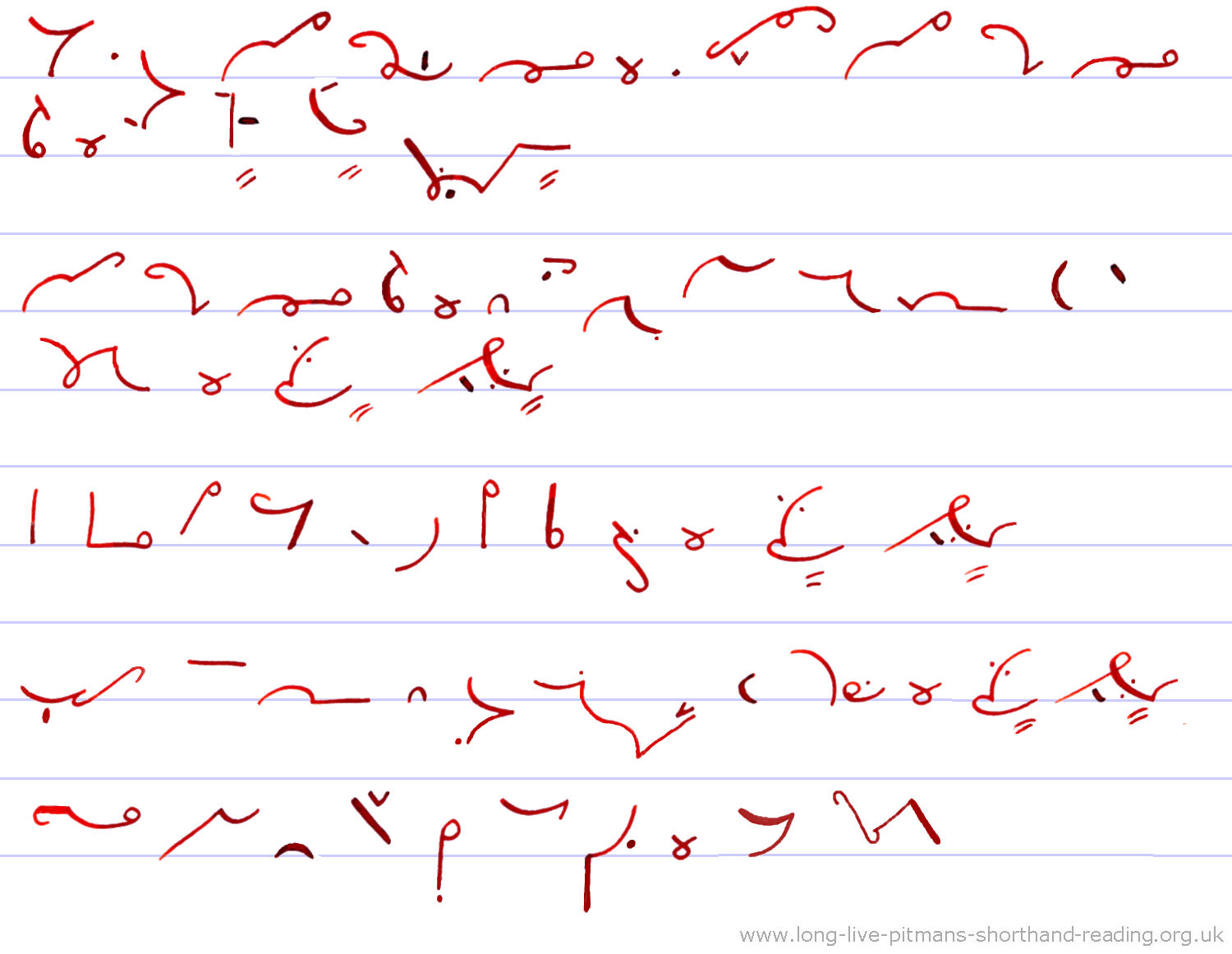
Only a fool learns from his own mistakes. The wise man learns from the
mistakes of others. Otto von Bismarck
Learn from the mistakes of others. You canít live long enough to make
them all yourself. Eleanor Roosevelt
It takes as much energy to wish as it does to plan. Eleanor Roosevelt
No one can make you feel inferior without your consent. Eleanor
Roosevelt
Gardens are not made by sitting in the shade. English proverb
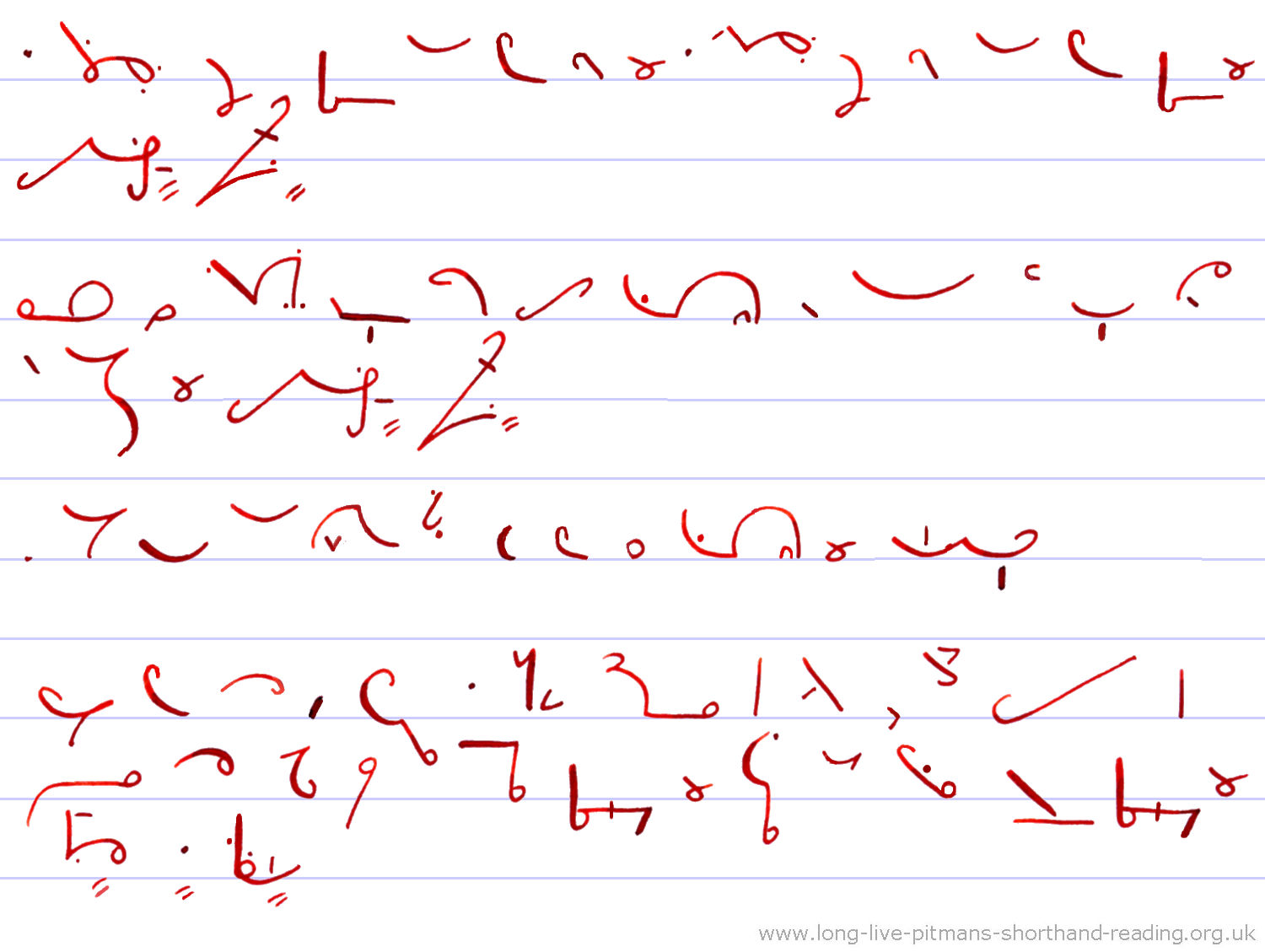
A pessimist sees the difficulty in every opportunity; an optimist sees
the opportunity in every difficulty. Winston Churchill
Success is the ability to go from one failure to another with no loss of
enthusiasm. Winston Churchill
The only thing in life achieved without effort is failure. Unknown
Nearly every man who develops* an idea works it up to the point where it
looks impossible, and then he gets discouraged. That's* not the place to
become discouraged. Thomas A. Edison
* "develops" This is the dictionary
optional contraction for
"development" but it is safe to use it also for the verb
* "that's" Apostrophied versions
are written as full outlines, ignoring the short forms
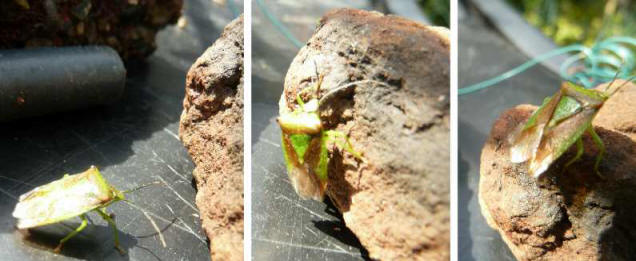
Meet Edison the Shield Bug, who did not become discouraged and made it
all the way to the top
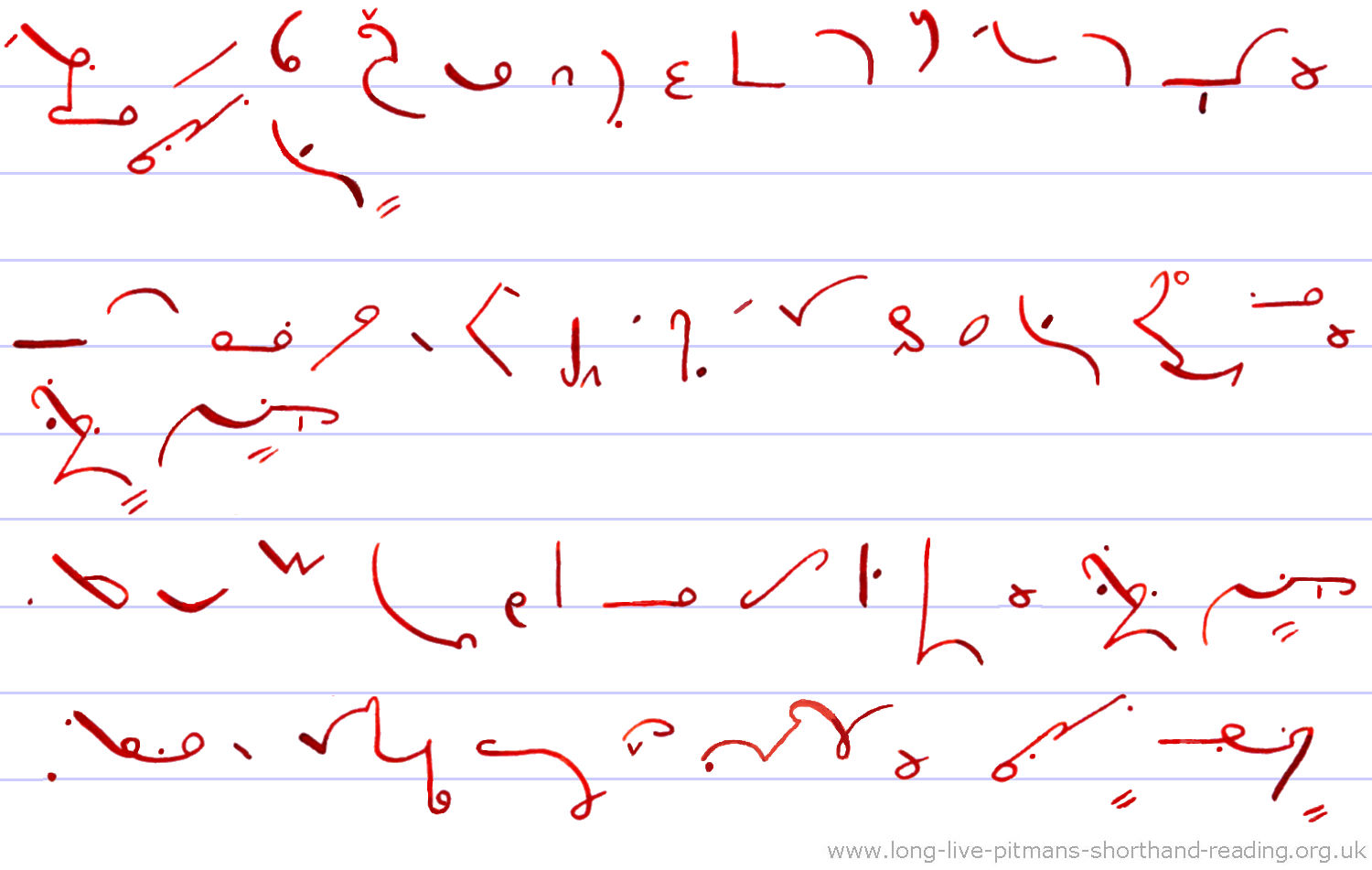
Obstacles are those frightful things you see when you take your eyes off
your goal. Henry Ford
Give me six hours to chop down a tree and I will spend the first four
sharpening the axe. Abraham Lincoln
The best thing about the future is that it comes one day at a time*.
Abraham Lincoln
The absence of alternatives clears the mind marvellously. Henry
Kissinger (219 words)
* Omission phrase "at (a) time"
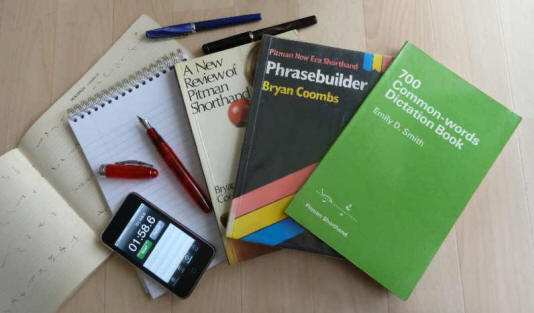
Axe-sharpening tools
The green book is in longhand text. You might find the similar "700
Common Words Reading and Dictation Exercises" more useful, which has
different text in both shorthand and longhand, and includes the common
word list plus derivatives.
Top of page
Get On With It
(22 June 2013)
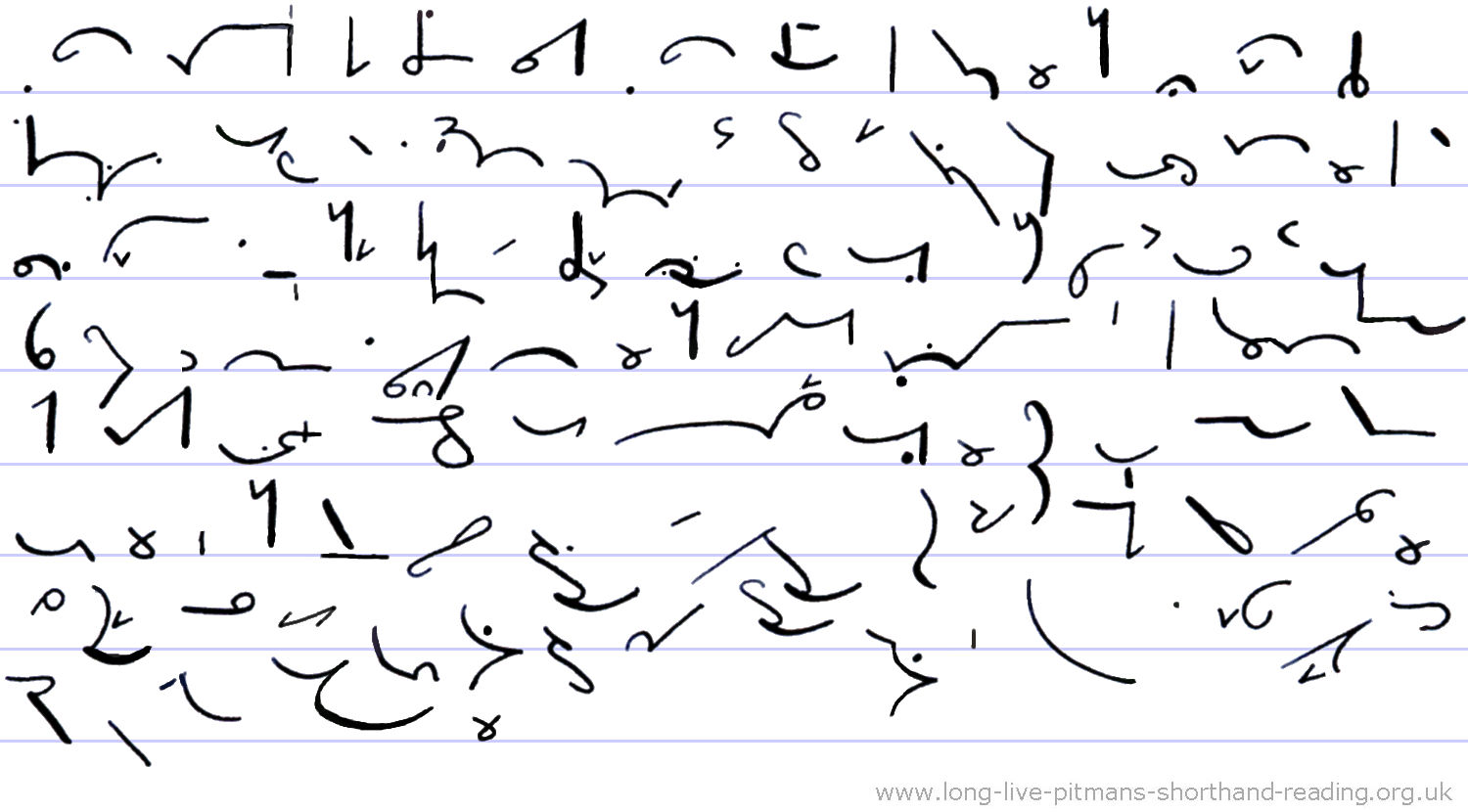
The more I looked at the task ahead, the more daunting it appeared. I
had made my decision, admittedly in the comfort of a warm room with the
plans on the paper pad in front of me. It all seemed like a good idea at
the time, and, despite the impending effort needed, I was still of the
opinion that undertaking this project would make a huge improvement. I
had wanted to embark on it for some time* and had already incurred
expenses in the materials needed. There was no going back now. But I had
become used to planning and replanning, so that I would get the best
result. As the saying goes, if you fail to plan, you are planning to
fail, but after a while real action cannot be put off any longer.
* "for some time" Halving to
represent the T of "time"
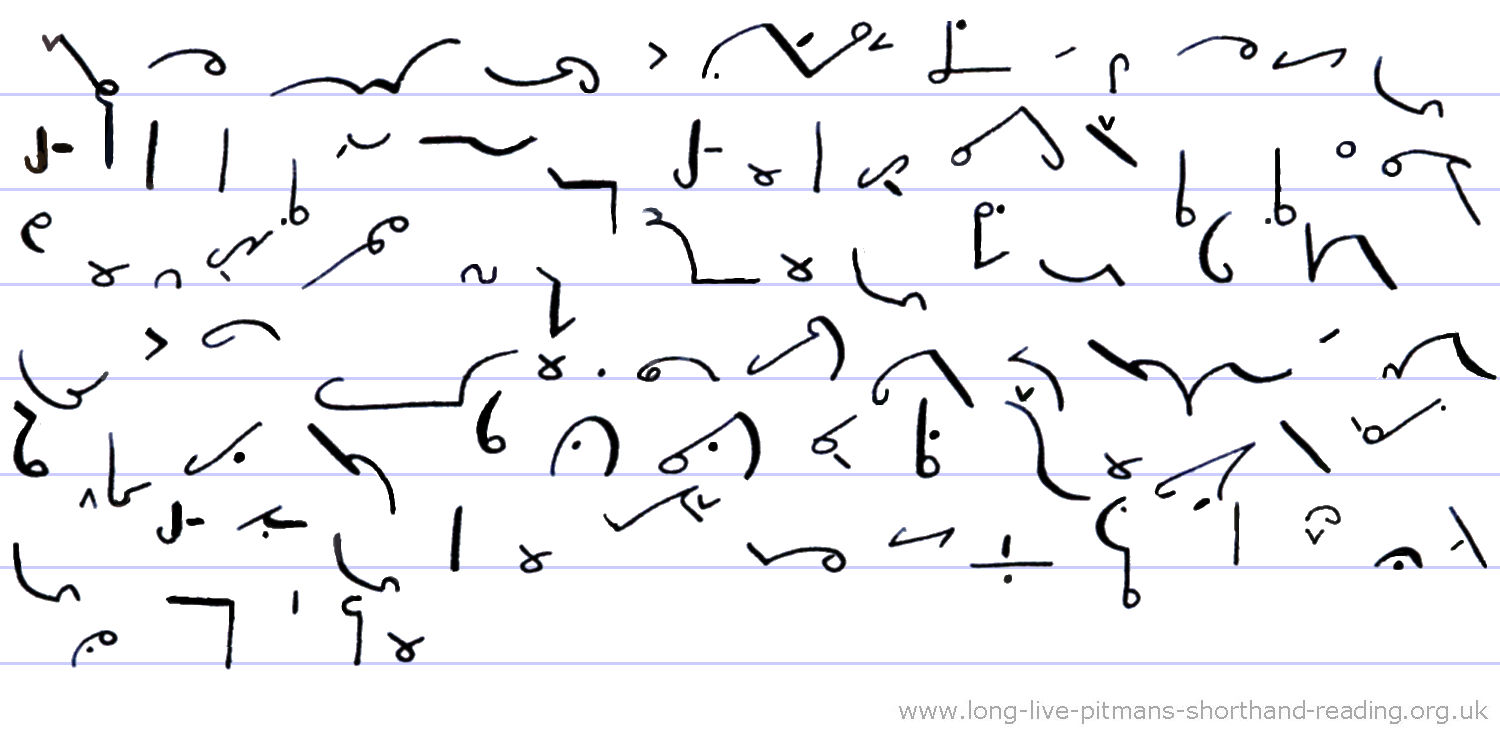
I positioned myself immediately in front of the laborious task and told
myself, "If you donít do it, itís not going to get done. It wonít happen
by itself, itís as simple as that. You want the results, you have to do
the work. If you start now, then it will be finished all the more
quickly. The summer weather will be here before long, and you will have
all this out of the way before those lazy hazy hot days arrive. Youíll
be sorry if you donít and glad if you do." I replied to myself, "OK,
thatís it, mind made up, letís get on with it."
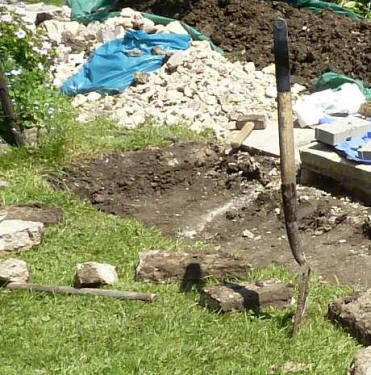
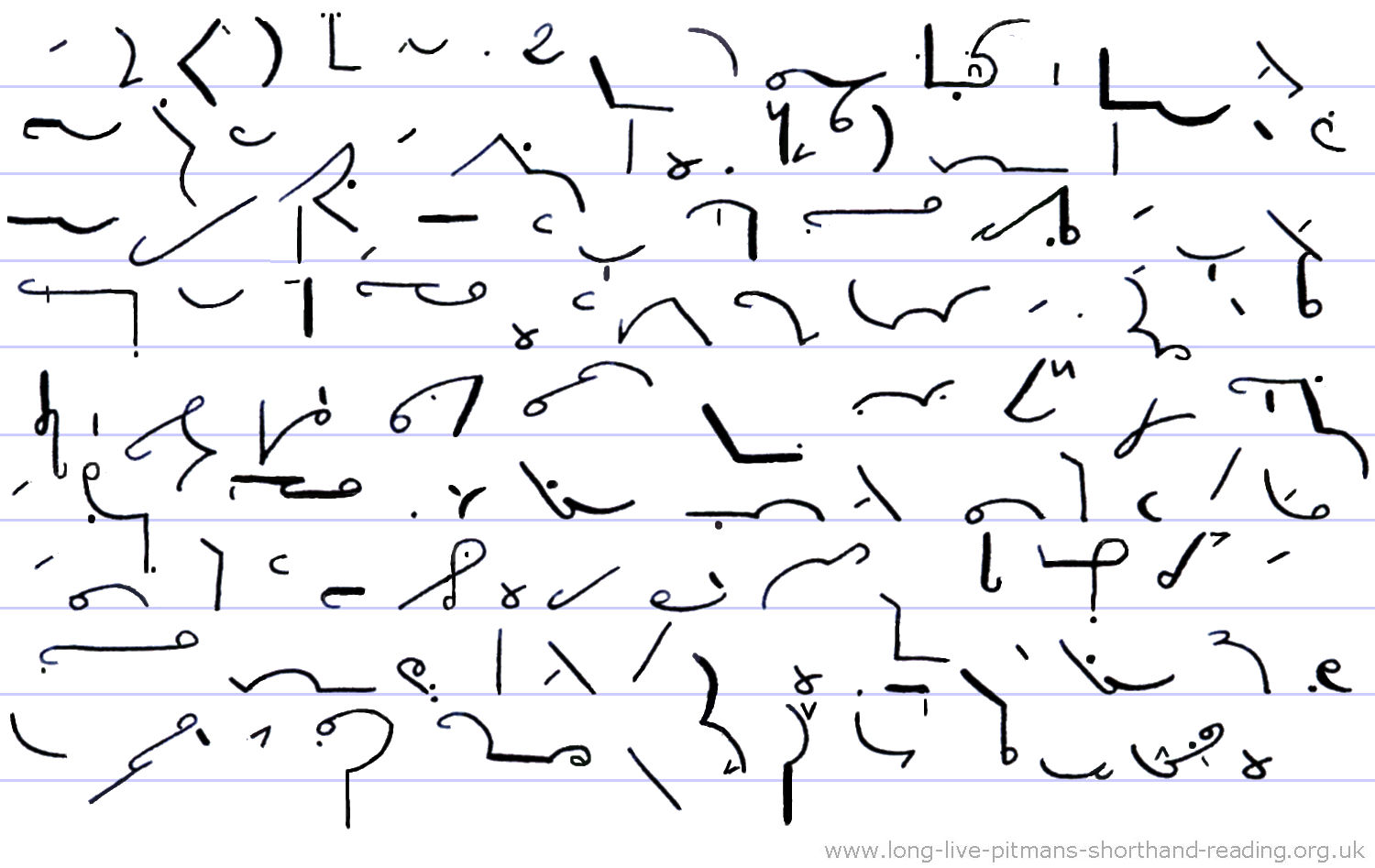
And so the job was attacked, not a shorthand book or something else
educational, but digging up the garden path in order to* reshape and
repair it. The idea was to make it all flat, going where it should go,
with no muddy cracks and weeds, and no puddles collecting in odd
corners. With help from the family and an assortment of destructive but
useful tools, sledge-hammer, big mallet, giant chisel, crowbar and
safety goggles, the old paving came up, some of it without much fuss
and some of it with great resistance. We soon learned to take advantage
of existing joins and cracks to make splitting it up much easier. The
good bits of paving were saved for reuse and the smashed fragments put
aside for the new foundations.
* Omission phrase "in ord(er to)"
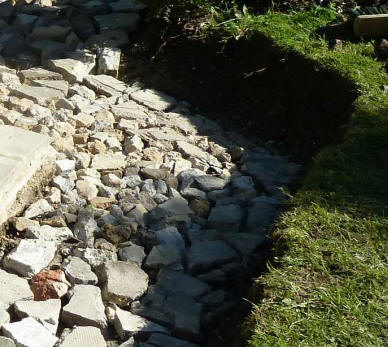
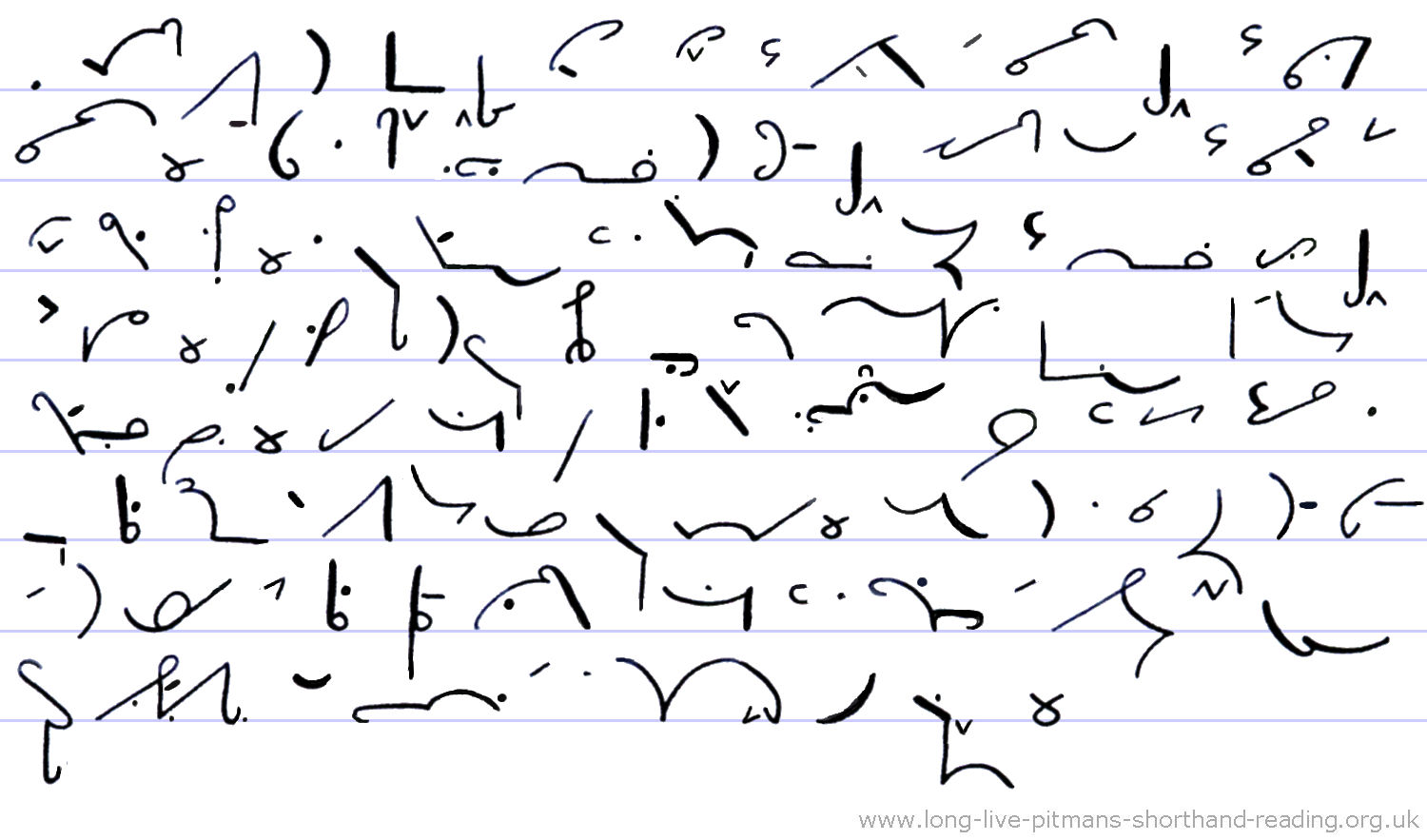
The altered route was dug out of the lawn, lined with the rubble and
hammered down with the sledge hammer. Then a dry concrete mix was thrown
down and watered in with the hose, on the light spray setting. A bit of
poking with a bamboo stick ensured that the mix went down all the holes.
Each stage was completed and satisfaction gained from mentally ticking
it off the progress list. We ended each day by congratulating ourselves
with, "That was a good dayís work, all ready for the next bit tomorrow."
Never was a hot shower so welcome and so necessary, and the dayís dusty
labour ended with a fragrant and restful* evening, plenty of restorative
hand cream, and an earlier than usual bedtime.
* "restful" Omits the lightly
sounded T
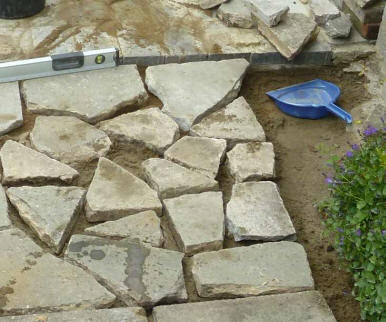
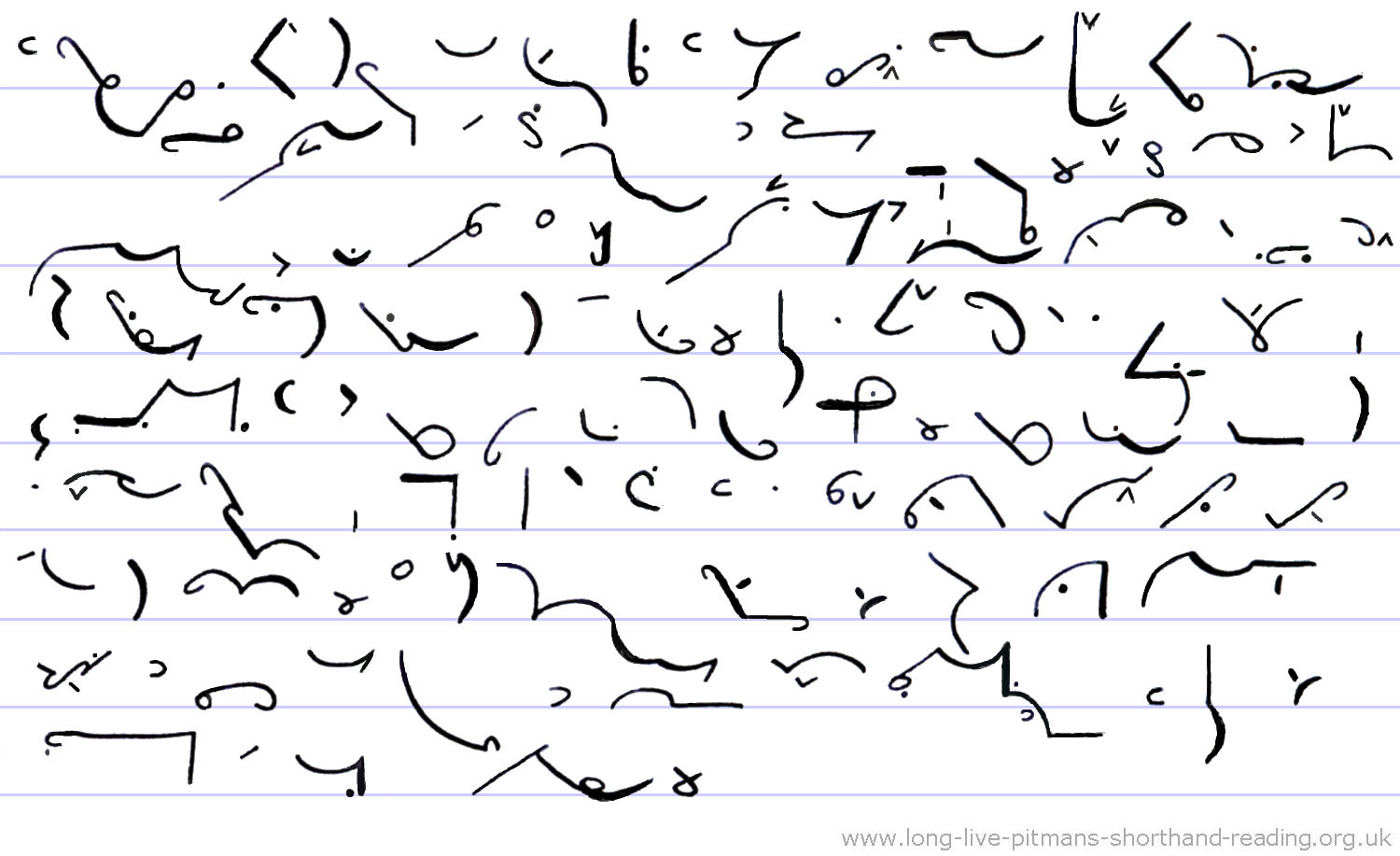
With perseverance the job was completed in four days, with only the
surrounding garden tidying jobs remaining, grass relaying and plant
moving, what I call the "good bits". I spent most of the time looking
forward* to the end result, as I did not really enjoy humping lumps of
concrete around, although placing the crazy paving was quite fun. It was
a giant version of a jigsaw puzzle, but without the guarantee that all
the pieces will fit or even exist. Pieces fitting together was a minor
problem, but getting it all flat, with a slight slope to allow the rain
to run off, was more important. As I was removing the broken old path
laid long ago, I wondered what someone in the future would make of my
handiwork when it was old, cracked and needed replacing.
* Omission phrase "looking
fo(r)ward"
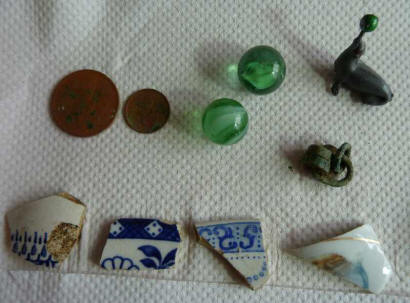
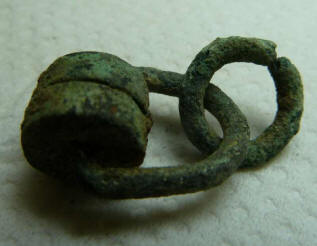
Time for a cup of tea from the best china
and a game of marbles. Mystery item 2 cm
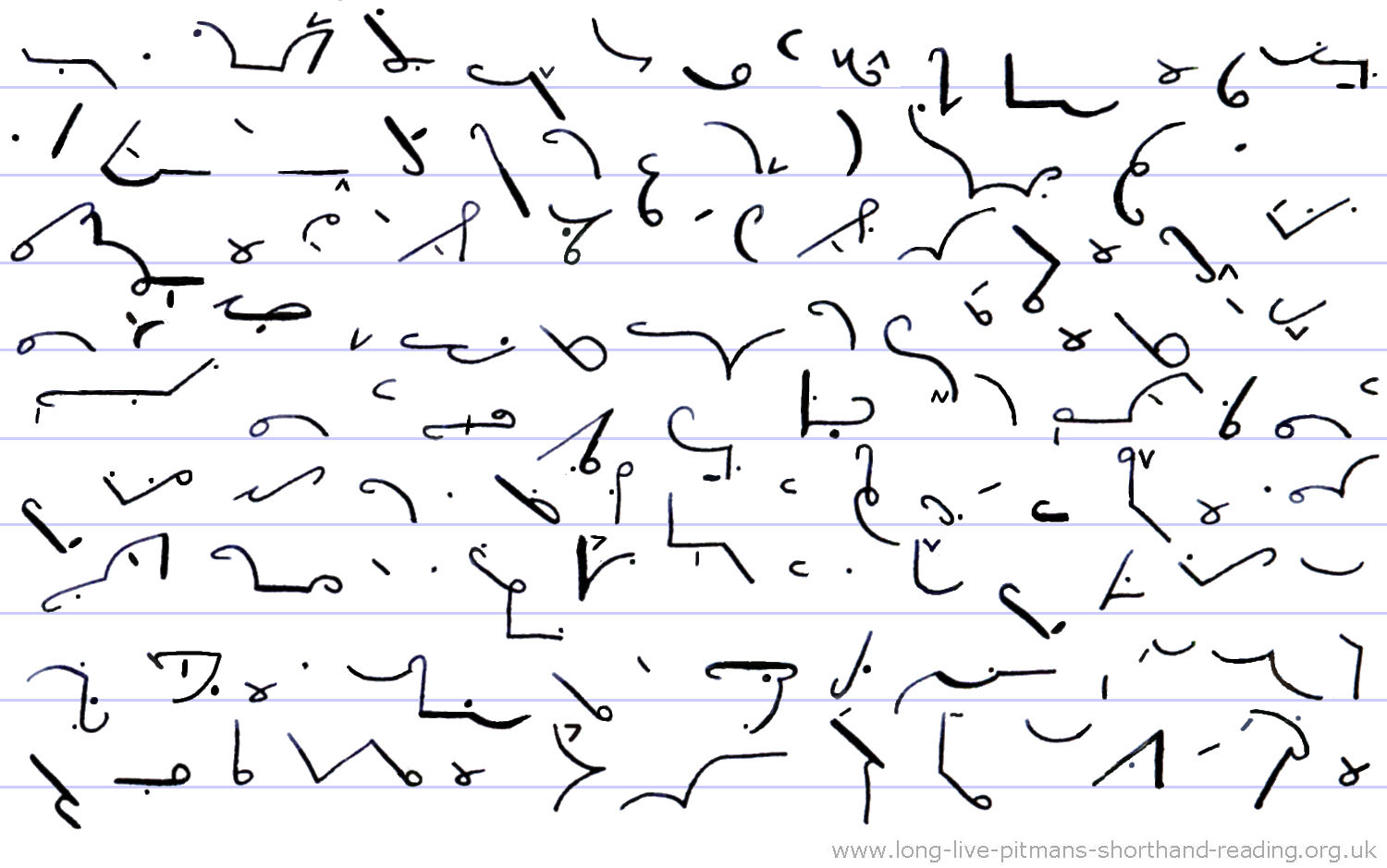
I kept an "archaeology" basket nearby for the things that I found during
the digging. These included a large chunk of cow bone, probably from
when this area was farmland less than* a hundred years ago; lots* of
rusty* nails and other rusted* metal objects; brown pottery, some old and
glazed, but the cleaner pieces clearly from flower pots; pieces of white
crockery, some with curves, ridges, fluted decoration or scalloped*
edges, some with blue patterns* and one from a
"best set" teacup with
transfer print and gold stripe; a small yellowed fragment of a plastic
doily with a tiny blue chequered* pattern in imitation of crochet; an
intriguing piece of greenish chain link, but not enough of it to be able
to guess its purpose; foil milk bottle tops in red and orange.
* "less than" Downward L for convenience of joining
* "rusty" "rusted" Ensure the T
stroke is clearly full or half length, as these two could be misread for
each other
* "scalloped" The first vowel is
pronounced O, despite the longhand letter A
* "lots" and "masses" Insert the
vowel, as these are similar in outline and meaning
* "patterns" Insert the vowel after
the P, as it is similar in shape and meaning to "appearance" in
paragraph 8
* "chequered" Keep the R Hook
clear, as "checked" and "check" would also make sense
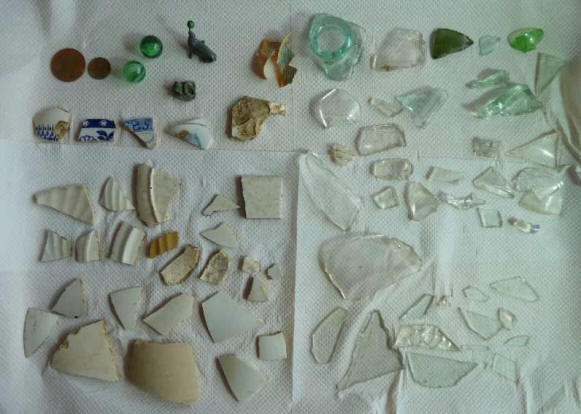

There were lots* of pieces of glass. The flat shards were obviously from
old windows. The curved and rounded pieces may have been from thick
bowls or bottles and thin delicate drinking glasses; two chunky bottle
necks; two pieces of obscured glass, one stripy from a cabinet door and
one in a blob pattern that was commonly used for front doors; fragments
of coal from the days when this house had open fires and the cinders
thrown out or maybe the coal stored in the garden; a two pence coin
dated 1971 and a halfpenny* coin dated 1976; two green marbles, one with
a twist and one streaky. Lastly*, while relaying some turf, I found a
very tiny grey plastic toy seal with a ball balanced on its nose. The
only thing I did not enjoy finding was a seemingly endless supply of
purple shaggy carpet tufts, each well attached to its lump of dry clay,
which I thought I had cleared and got rid of when we moved in thirty
years ago. Obviously some bits had become dug in and remained under the
grass waiting to be rediscovered.
* "lots" and "masses" Insert the
vowel, as these are similar in outline and meaning
* "halfpenny" Pronounced hape-nee
* "lastly" Omits the lightly
sounded T
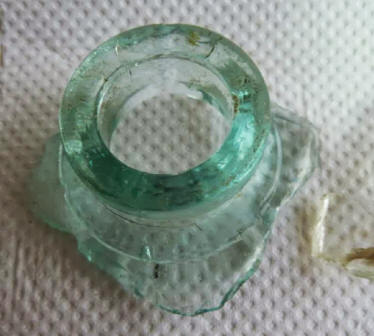
Matches the foil bottle tops found
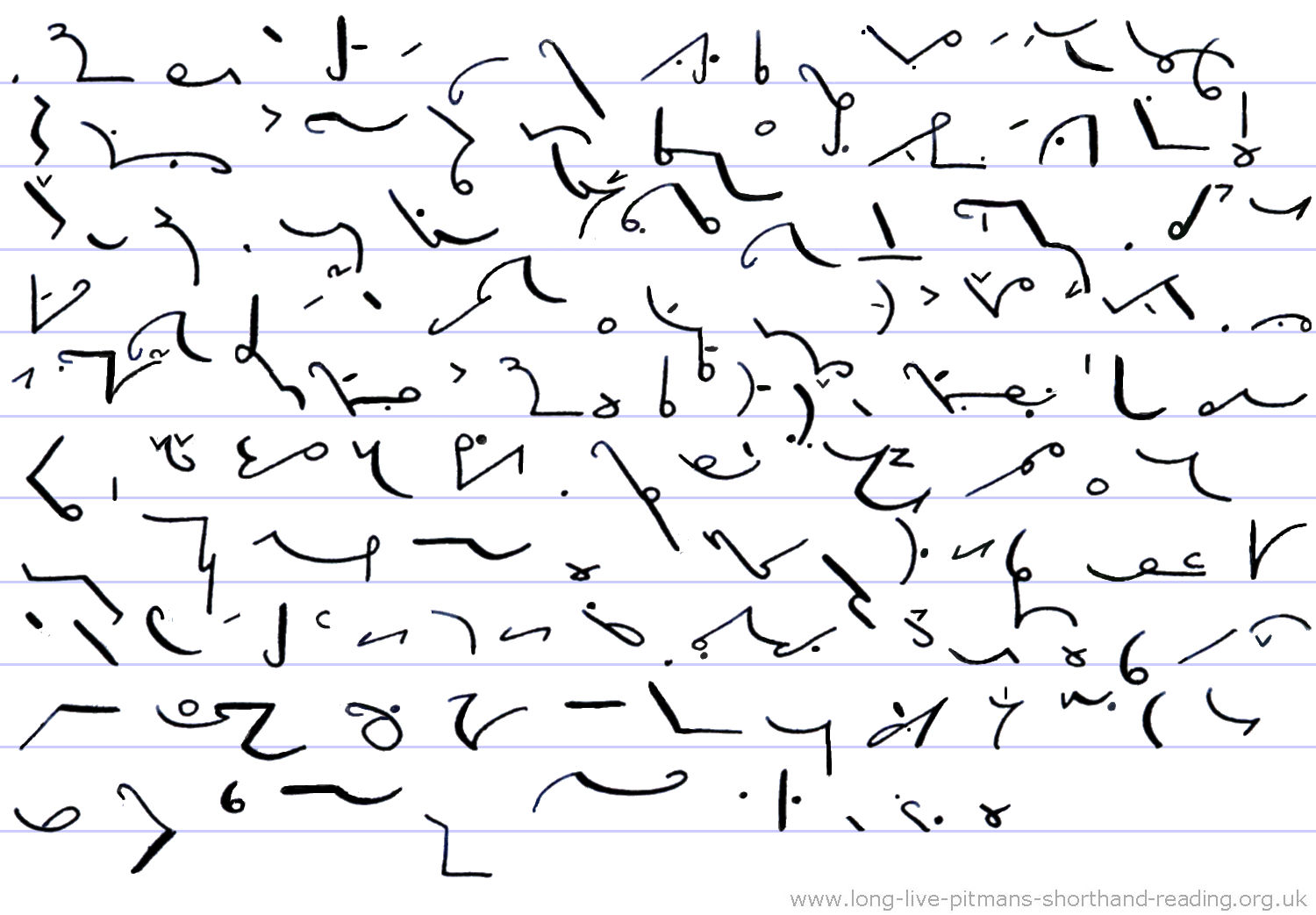
The work is now all done and will probably retain its pristine
appearance* and novelty for some months, although the remainder of the
garden paths I am conveniently describing as "rustic and laid back"! By
the end of the year, the newer paving slabs will have become grubbier,
the joins in the turf will have disappeared, and all we will have is
photos to remind us of the piles of rubble, the mess and the gradual
progress of the work. It is so easy to procrastinate* on doing certain
jobs, but I find that once I have started, the prospect of soon enjoying
the results is enough to keep the activity and interest going. I prefer
to be able to say, "This time next week* it will all be over and done
with" or "Past the halfway point now". These are my regular
self-encouraging phrases and they will go back into storage until I need
them for the next project that is going to take longer than a day to
complete. (1131 words)
* "appearance" Insert first vowel,
as it is similar in shape and meaning to "patterns" in paragraph 6
* "procrastinate" Omits the lightly sounded
first T
* Omission phrase "ne(k)s(t w)eek"
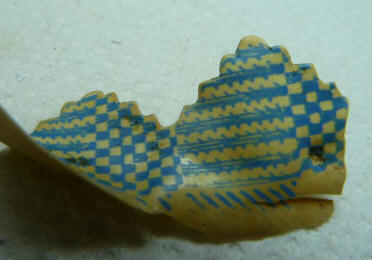
Fragment of pinked plastic doily or tray "cloth" imitating stepped
crochet edge - long before pixels were invented
Top of page
It's The Business (30 June 2013)
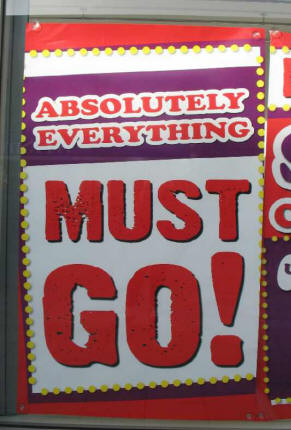
Mangled outlines, that is
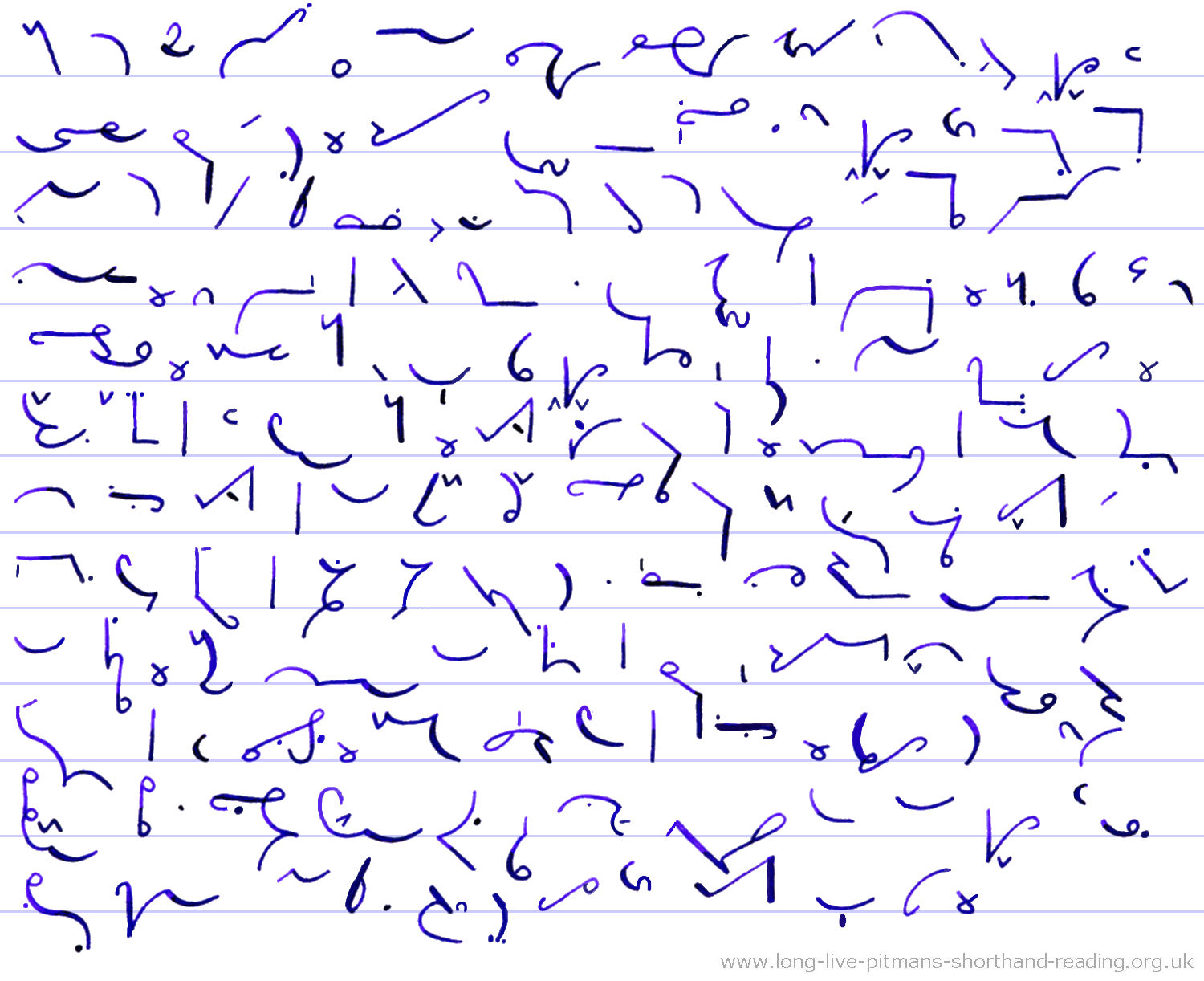
I hope* your shorthand learning is going smoothly and successfully, and
that you are mopping up the outlines with increasing speed and ease. I
wonder if you have come across a particular outline that you keep
getting wrong, or which just sticks to the end of your pen or pencil and
gets regularly mangled. You look it up, practise a few times and think
that you have it licked. I did this with the word "correspondence". I
knew I had to know this outline, but it was a long tricky one. Finally,
I attacked it with everything I had. I wrote whole pages of it. To make
sure it never escaped me again, I wrote it in giant size across the pad,
about four inches wide, and copied over the top of it endlessly until
the paper was a soggy mass of black ink and fell apart in tatters. I was
not making any attempt at speed, but I wanted my fingers to be able to
form it without hesitation. I never stumbled over it again. This one was
particularly satisfying as it is a graceful flowing shape, but this
method should be used for any outline that needs severe drilling, and
not just the beautiful easy ones that you already know well.
* Omission phrase "I (h)ope"

Exit the Bothersome Outlines Zone
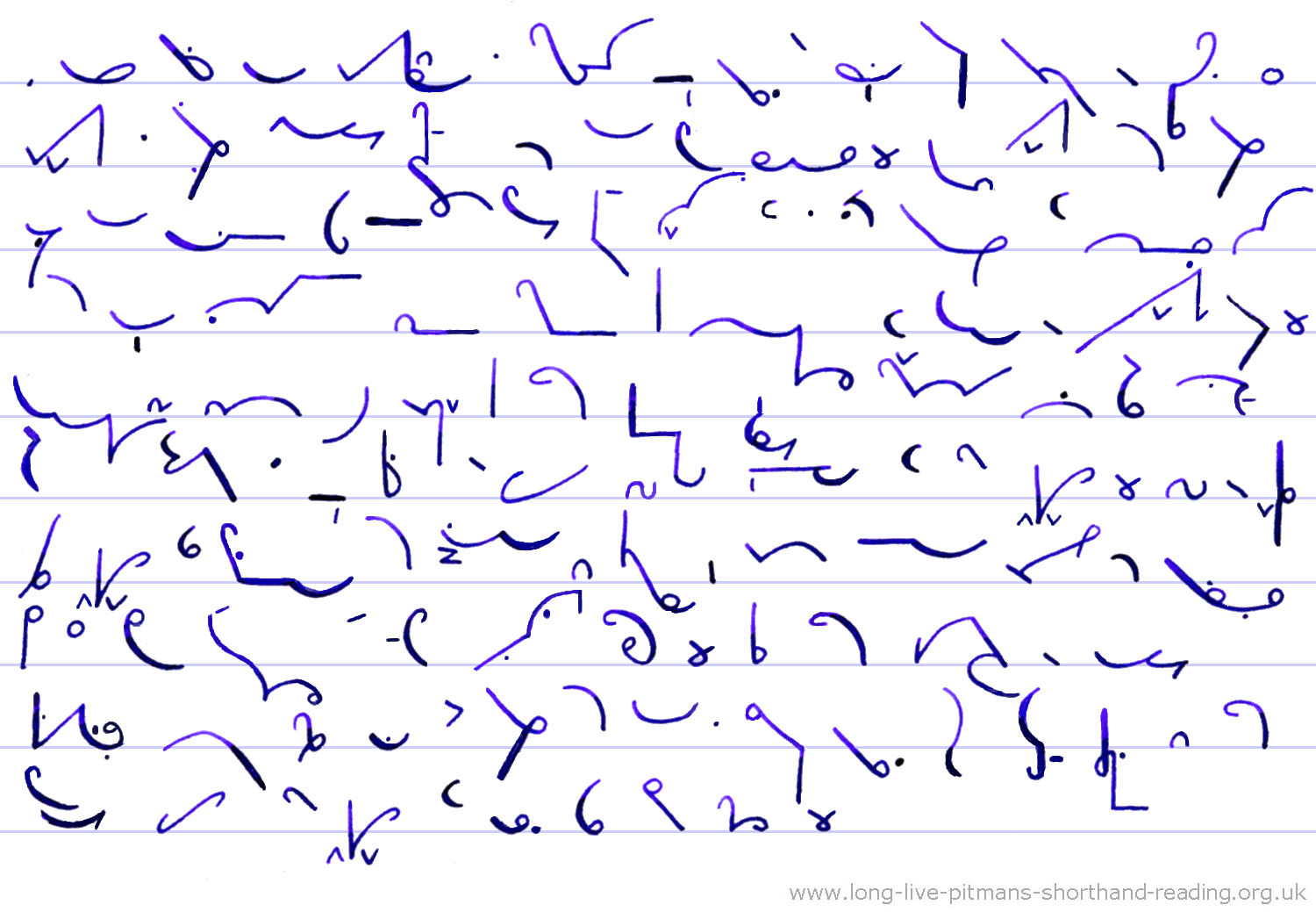
The next best thing to reducing a perfectly good piece of steno pad
paper to shreds is to write a passage and include the troublesome word
in every sentence. If you write your passage neatly in ink, then go over
the top lightly with a hard pencil that makes little or no mark, you can
practise it many times without having to rewrite the page. Eventually
you may wish to try it from dictation, but that is not the primary aim
of this method, although that would be a good test of whether you have
conquered that particular outline. You have to decide which is the
outline that is plaguing or annoying you at present, but I am going to
use the word business, as it has several forms and other related
versions. It is very helpful to include the derivations, maybe towards
the end of the passage, or in a separate piece, so that they donít
distract you from overcoming the one particular outline that needs this
special treatment.
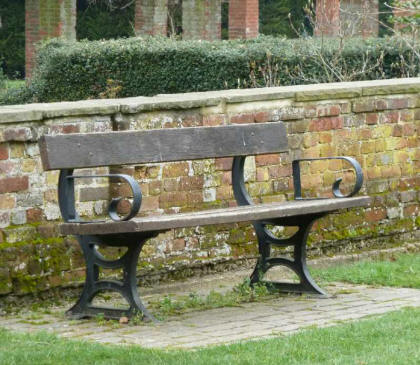
Park seat + snack + shorthand pad = business and pleasure mixed
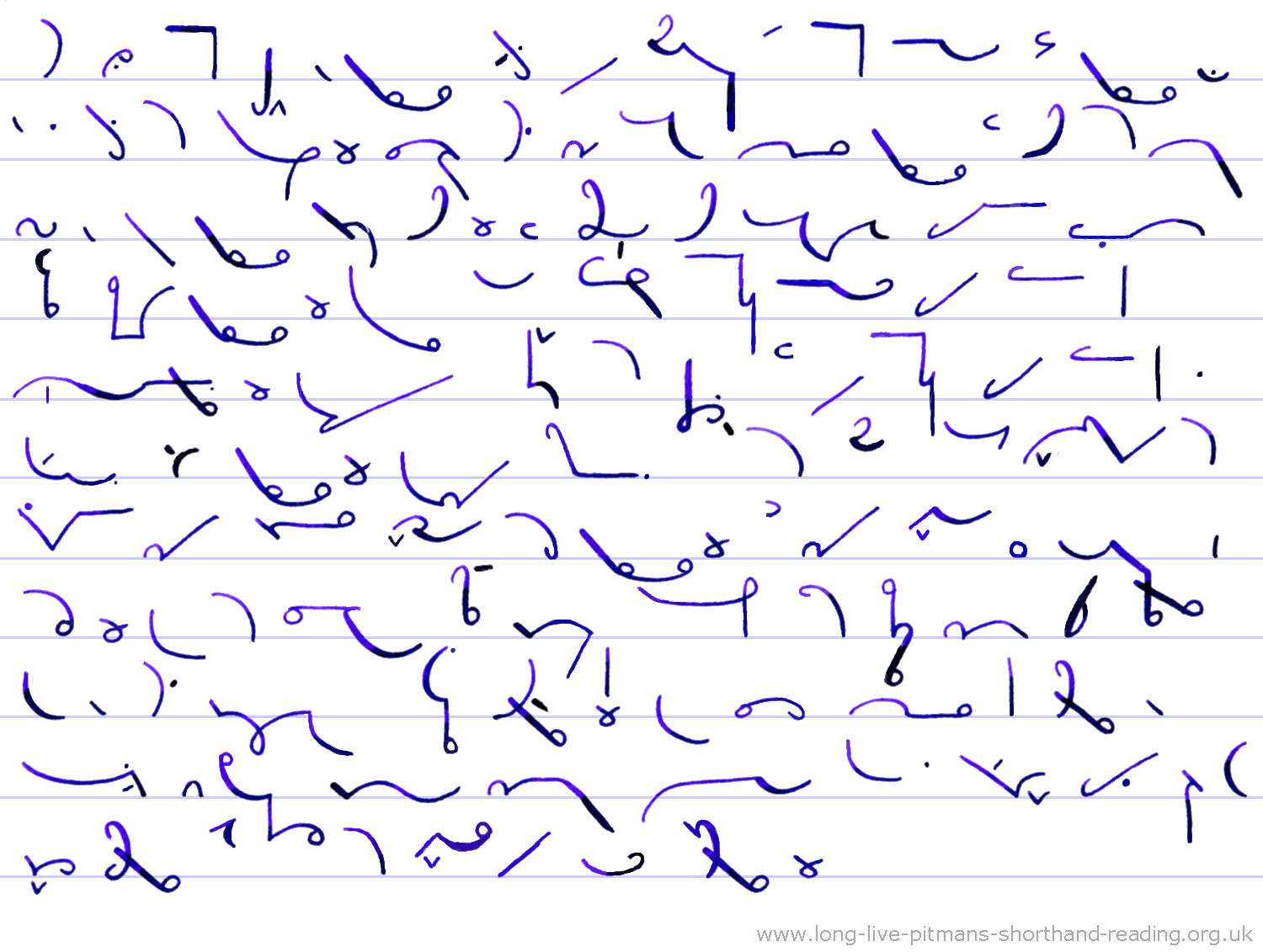
So letís get down to business, open our shorthand pad and get going with
the business end of a pen or pencil. Some people say you should never
mix business with pleasure, or maybe you have to put business before
pleasure. When there is no pleasure involved, we can claim that it is
strictly business. If there is* any questionable activity going on, we
call it monkey business. If we are tired or disillusioned with our
activity, we call it a funny old business. If you are practising your
shorthand in the library or park, you are of course minding your own
business. What you are writing is nobodyís business but yours. If your
scribbling draws too much interest from strangers, you may just have to
say to yourself "Thatís show business!" If someone makes it their
business to interrupt you several times too many, you may be looking for
a polite way to tell them to mind their own business and that your
writings are none of their business.
* "if there is" Doubling is used
for "if there" but never used in "for their", so that these two are
never misread for each other, similarly halving for "if it" but never in
"for it"
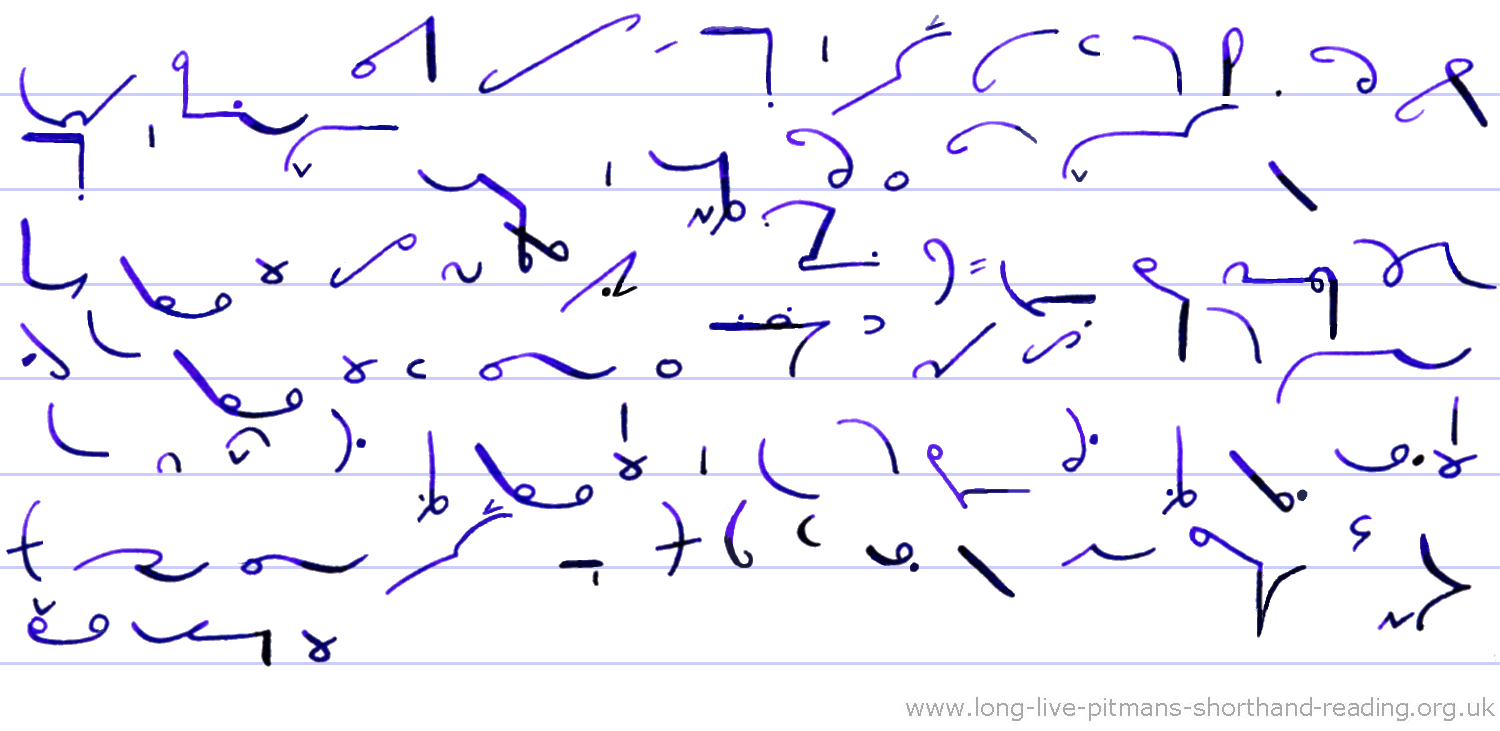
If you are streaking ahead wonderfully* and getting on really well with
your study, the phrase used to be*
"getting on like nobodyís business"
but nowadays the phrase is more likely to be "doing the business". Once
you have reached the magical three-figure speed, you can consider*
yourself open for business. When something is exactly what you are
wanting or looking for, you might say "Itís the business!" but if your
speaker says "Itís the beeís knees!" (meaning something really good)
then that needs to be written separately, with the vowel signs included.
* "wonderfully" If you need to
clarify that this is -fully (and not -ful) then write those two strokes
in as well
* Omission phrase "you can (con)sider"

Some free bees-ness dictation perhaps?
YouTube: The Bee
Song
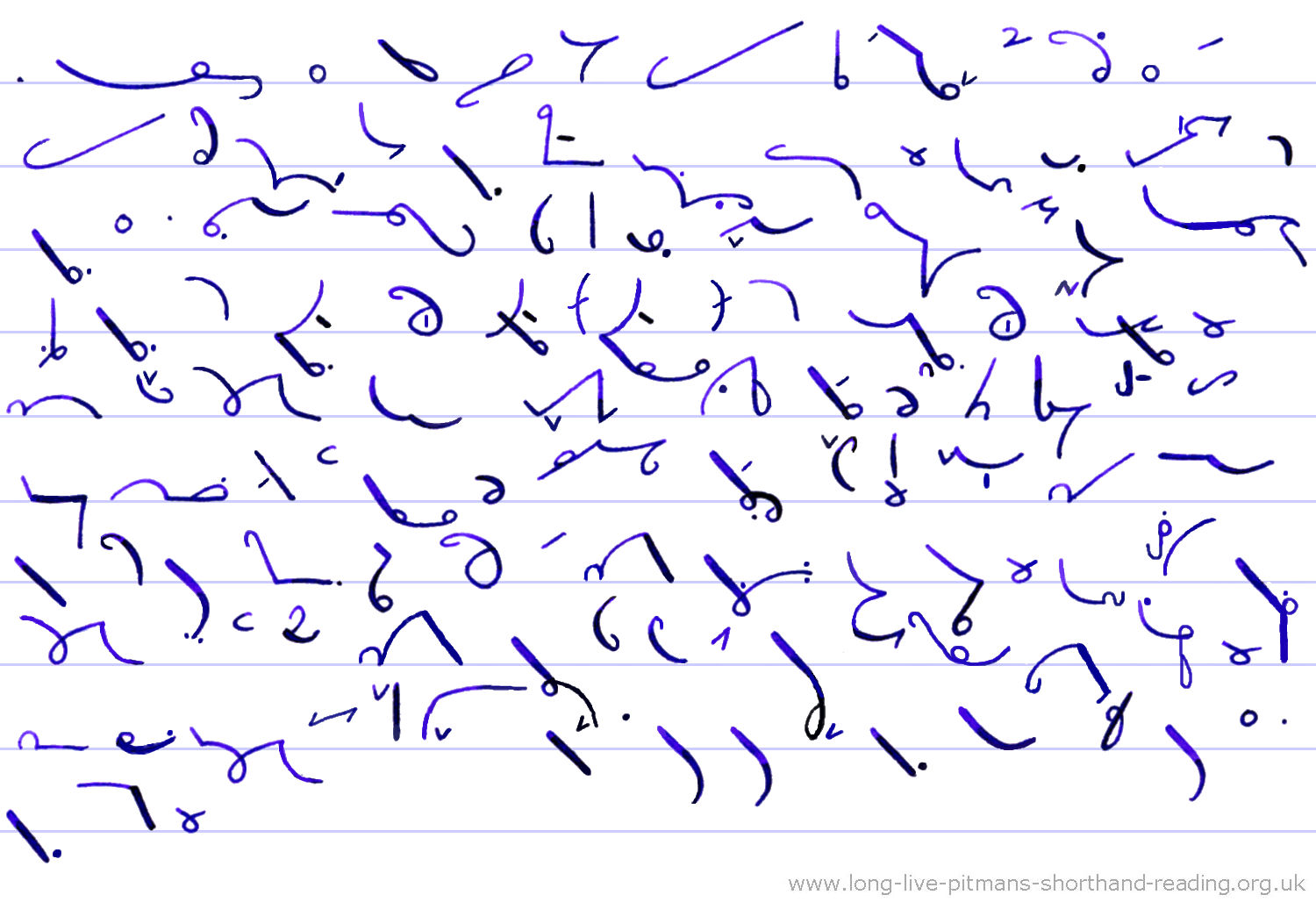
The intersection is best used only where it is obvious what the phrase
is and where there is room for the Bee stroke to remain clear. If you
need to record the word "biz", as a slang expression, then it needs
writing separately and with the vowel, for example "Itís the biz" or
"showbiz" versus "show business (show business)" or "newbies" versus
"new business". You may find yourself having to write the latest
buzzwords, which you definitely donít want to get mixed up with business
words, and certainly not buzzards either! I know you are going to be
very busy practising all these phrases, and you will be busily filling
the pages. If you have constantly busied yourself with shorthand, you
will be busier than ever and the busiest person will be the fastest. You
can sing to yourself "Iíd like to be a busy busy bee, being just as busy
as a bee can be."

Sometimes it's hard to tell if the workers are getting on with
buzzy-ness or just taking a secret nap
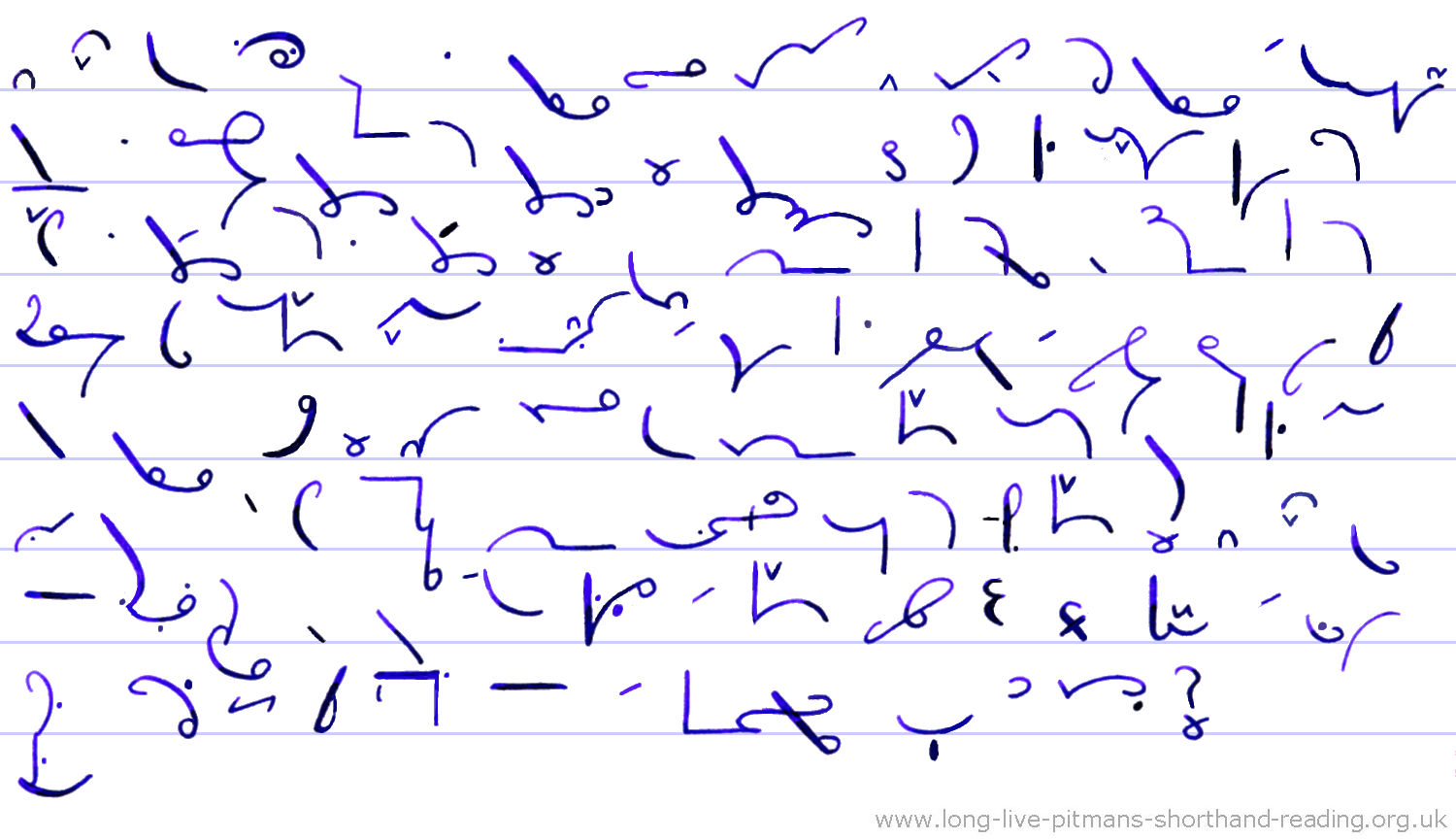
You might have ambitions to take a business course* to learn how to run
your own business, and eventually become a successful businessman* or
businesswoman*. Businessmen and women* spend their day entirely
differently from either a busman or a postman*. If you make it your
business to work at your shorthand skill, then in time writing
accurately and easily at a reasonable and useful speed will just be
"business as usual." You will, of course, have to make time in your busy
day and not let the "busy-ness" of other activities make incursions into
your study time. You might even go so far as to put off delays and
time-wasters with that bold, defiant and faintly threatening phrase,
"Just gotta go and take care of business, know what I mean?" (932 words)
* "business course" If you use the intersection, write it first and the
outline second
* Omission outlines/phrases "biz(ness)man"
"biz(ness)woman" "biz(ness)men (and) women"
* "postman" Omits the lightly
sounded T
Top of page
|
